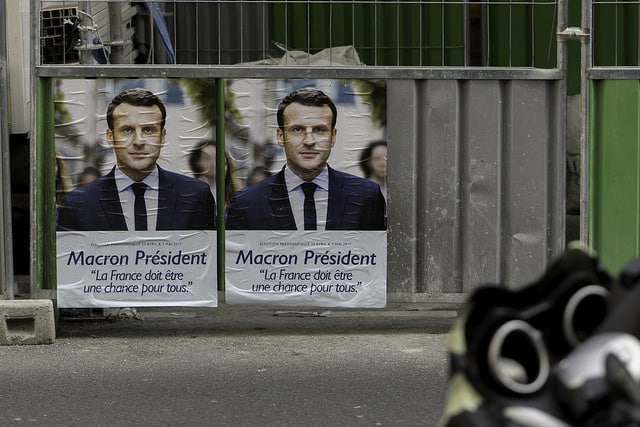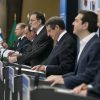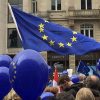
In Emmanuel Macron, France has secured a pro-European President (one might go as far to say romantically pro-European), outstripping François Hollande by some margin in this respect, but in a society that is divided on the issue. It undoubtedly gives some breathing space to the European project and opens a window of opportunity upon some inviting prospects, although it remains to be seen whether Germany, following its elections in September, will clamber aboard this particular vehicle with any conviction. The election results have set a limit in France (which is not alone in this respect): reform of the treaties will not be possible if they need to be submitted to a referendum. Because while Marine Le Pen secured 34% in the second round –less than expected, but a considerable tally–, the anti-EU vote in the first round, from both left and right, accounted for between 40% and 49%, depending on how the count is done. This is in any event too much in a country that in 1992 was on the brink of torpedoing the Maastricht Treaty and in 2005 rejected the European Constitutional Treaty by 54.6%, both in referendums. Nevertheless, some opinion polls suggest that 72% of French voters want to retain the euro, provided it is in a Europe that is more French. Europhobic populism has been halted, but it still exists in force, although given the French electoral system this is unlikely to translate into many seats in the forthcoming legislative elections.
Even so –and the parliamentary elections will determine the extent of the power he will be able to call on–, Macron will seek to ensure that things move forward in Europe, using the current treaties. Within their scope, and taking them to the limit, many things may be achieved if a vision exists for doing so. Does Macron have an overarching vision? He is one of those who subscribe to the theory that European integration involves not a loss but a recovery of sovereignty –‘a sovereignty tool for many issues’– for a country such as France. This would apply for example to the euro, in the context of the Bundesbank diktat that has prevailed hitherto, as set out in his manifesto in the chapter meaningfully titled ‘A Europe that protects Europeans’. It is something he has reiterated throughout the campaign: ‘Europe makes us greater. Europe makes us stronger’. This is the opposite of what Le Pen and Mélenchon sought with their criticisms, from their various perspectives, of France’s ‘submission’ to Europe. Macron, however, views the euro as a ‘weak Deutschmark’, which unless reformed is doomed to fail.
The French President-elect has three key proposals on the issue: to complete Banking Union; a European budget for investments in the future, with emergency financial aid in response to economic crises, in other words fiscal union; and a Eurozone economy and finance minister. Germany supports the first in part, and rejects the second. In addition –this was an issue he tackled as a minister– he suggests kick-starting digital Europe with a €5 billion venture capital investment fund, among other measures.
Macron also advocates a Europe that protects from globalisation, with antidumping instruments against the unfair competition of countries such as China and India, a Buy European Act and a European trade prosecutor. He wants to secure an EU that is more attractive by, for instance, revamping the Erasmus student exchange programme so that it incorporates 25% of the French people of qualifying age and European legislation on in-work training to facilitate mobility.
Macron subscribes to the Italian idea that, after Brexit, the 73 British seats in the European Parliament should be assigned to a pan-European list voted for by everyone. And amid the impossibility and danger of a convention to reform the treaties, he suggests holding national ‘democratic conventions’ at the end of this year –following rules established by each country– to determine broad roadmaps for the EU, with governments debating the conclusions in the European Council.
Nor does he forget that the EU has to do more for its own security, for example, strengthening the new European Border and Coast Guard Agency with 5,000 additional personnel and encouraging police and judicial cooperation on a Europe-wide scale. He also suggests setting up, with those who support it, a European Defence Fund, a general headquarters (to be coordinated with NATO) and a European Security Council (comprising the leading military, diplomatic and intelligence representatives of the member states). Germany also advocates a defence role for Europe.
Macron thus subscribes to the idea of a multiple-speed Europe, taking a relatively intergovernmental approach. Here there is scope for rapprochement with Germany, with which he wishes to improve relations, as he made clear in a speech at the Humboldt University of Berlin last January (delivered in English). He knows that he will not earn credibility in Berlin unless he manages to reform France. In other words, Macron’s European policy starts at home.
Given the situation, to which should be added Brexit, Spain has a role to play. Together with Italy it can align itself with France, not in opposition but rather to apply pressure on Germany. However, the realities of an ageing German society, albeit still riding a wave of economic success, restrict the room for manoeuvre in terms of reducing the twofold trade and budget surpluses that damage the Eurozone as a whole. This holds both for the Christian Democrat Angela Merkel and her Social Democrat rival Martin Schulz (assuming there is no repeat of the Grand Coalition).
Europe was one of the key issues, perhaps ‘the’ issue, of the French election campaign. Some opinion polls suggested that two thirds of voters regarded the European question as a factor weighing upon their decision. And it did have a bearing. Although it has also become plain that in order to re-establish support for the European project and restore the EU’s pride, it must be built not top-down but rather bottom-up, and in such a way that those at the top do not neglect those at the bottom. Because in France the debate is not over, Le Pen is not finished politically (as the Germans know full well) and what happens in France in five years, in 2022, will depend to a large extent on what Macron achieves and on the evolution of the EU as a whole.


